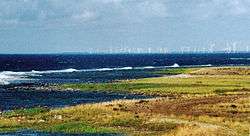Näsudden
|
Näsudden wind farm seen from Hoburgen | |
 Näsudden | |
| Geography | |
|---|---|
| Location | Baltic Sea |
| Coordinates | 57°04′15″N 18°13′45″E / 57.07083°N 18.22917°ECoordinates: 57°04′15″N 18°13′45″E / 57.07083°N 18.22917°E |
| Country | |
Näsudden is a peninsula on the south coast of Gotland, Sweden. The first tests for using wind power on a large scale in Sweden, were conducted there in the 1970s. The area has since been developed into a wind farm. Part of the peninsula is a nature reserve for birds and grey seals.
Geography
Näsudden is a peninsula on the south coast of Gotland, Sweden, adjacent the localities of Näs, Fide and Burgsvik.[1]
Wind power
It was on Näsudden that wind power on a large scale was first tested in Sweden. The Swedish power company Vattenfall, started to explore and develop wind power in the 1970s, and southern Gotland was selected as a suitable location for tests in 1979. Construction of a prototype wind turbine, the Näsudden I, started in the beginning of the 1980s. The prototype was ready and started in 1983.[2] The collecting of data from the trial runs and evaluation of the project was financed by the Swedish government. The study became the base for further research in wind power technology in Sweden.[3] Näsudden I was in operation until 1989, when it was replaced by Näsudden II.[2]
Näsudden was developed into a large wind farm during the 1990s. In 2010, it had the highest wind power density in Sweden. In 2014, there were 60 wind turbines on Näsudden, ten of which were owned by Vattenfall.[3] In 2004, the then-largest land based wind turbine, the Olsvenne 2, was built on the peninsula.[4] On 9 January 2007, the Näsudden II was decommissioned. During the time it was in operation it produced 61,4 GWh in 61,496 hours, a world record at that time.[2]
On Näsudden, there is also a 120 m (390 ft) mast with instruments for measuring temperature, wind direction, wind speed and other meteorological data on different altitudes. The readings are continuously presented on line, where it is available to anyone.[5] In 2009, there were a total of 156 wind turbines on Gotland, producing 200,158,000 kWh of electricity.[6]
In 2014, the last of the first large wind turbines were torn down and dismantled. They will be replaced by a new generation of more efficient turbines. Prior to that, a new cable for transmitting the electricity to mainland Sweden must be in place, since the existing one is insufficient for the energy produced by the new turbines.[3]
The Näsudden wind farm is open to the public and has an exhibition about wind power.[7]

Nature reserve
On the southwestern tip of Näsudden is the 94 ha (230 acres) Näs Reef Seal and Bird Reserve (Näsrevets säl- och fågelskyddsområde).[8] The area has a rich bird life, it is the second most visited habitat for greylag geese in the Baltic Sea during their annual "wing moult". It also has a small colony of grey seals.[9]
References
- ↑ "Näsudden - vägbeskrivning" [Näsudden - how to get there]. www.guteinfo.com. Guteinfo. Retrieved 26 June 2015.
- 1 2 3 Hållén, Jonas (7 December 2007). "Slutet nära för första vindkraftverket" [The end is near for the first wind turbine]. www.nyteknik.se. Ny Teknik. Retrieved 26 June 2015.
- 1 2 3 Jardim Ribeiro, Cristina (6 November 2014). "De plockar ned vindkraftverken" [They dismantle the wind turbines]. www.helagotland.se. Helagotland. Retrieved 26 June 2015.
- ↑ "Olsvenne (Sweden)". www.thewindpower.net. The WindPower. Retrieved 26 June 2015.
- ↑ "Driftuppföljning vindkraft" [Operation monitoring for wind power]. www.vindstat.nu. Wind Power Forecasting.
- ↑ "Vindkraftsstatistik 2009" (PDF). www.energimyndigheten.se. Energimyndigheten. Retrieved 26 June 2015.
- ↑ "Sommaröppet på kraftverken" [Power plats open this summer]. www.corporate.vattenfall.se. Vattenfall. Retrieved 26 June 2015.
- ↑ "Näsrevet djurskyddsområde" [The Näs Reef Seal and Bird Reserve]. www.guteinfo.com. Guteinfo. Retrieved 25 June 2015.
- ↑ Martinsson, Magnus (25 February 1999). "Näsuddens kust" [Näsudden's coast]. www.gotland.se. Gotland Municipality. Retrieved 26 June 2015.
External links
| |||||||||||||||||||||||||||||||||||||||||||||||||

